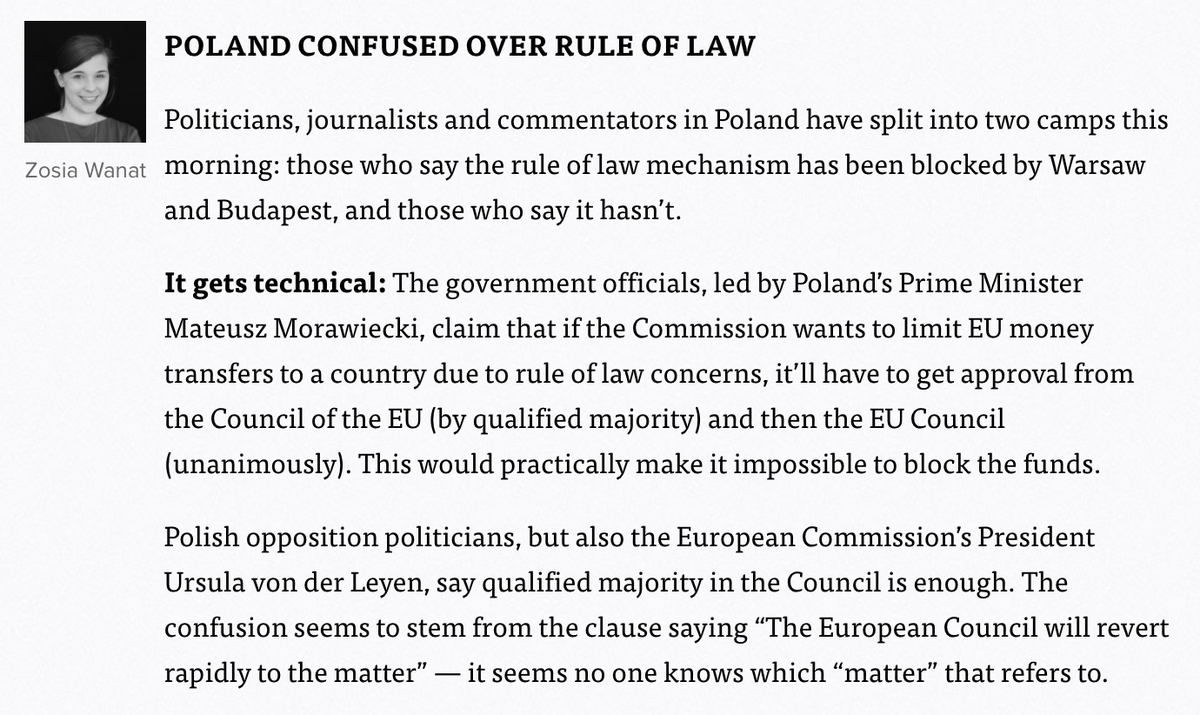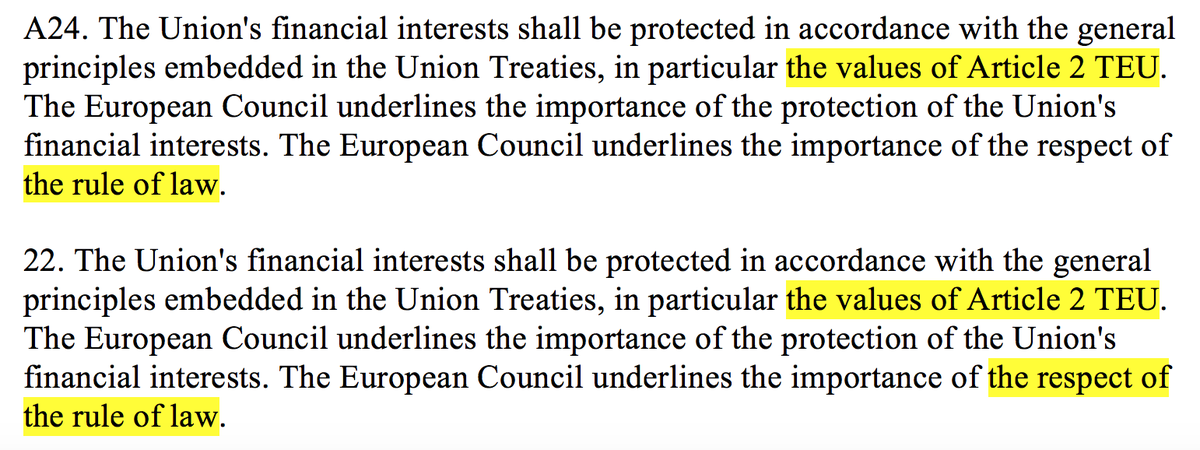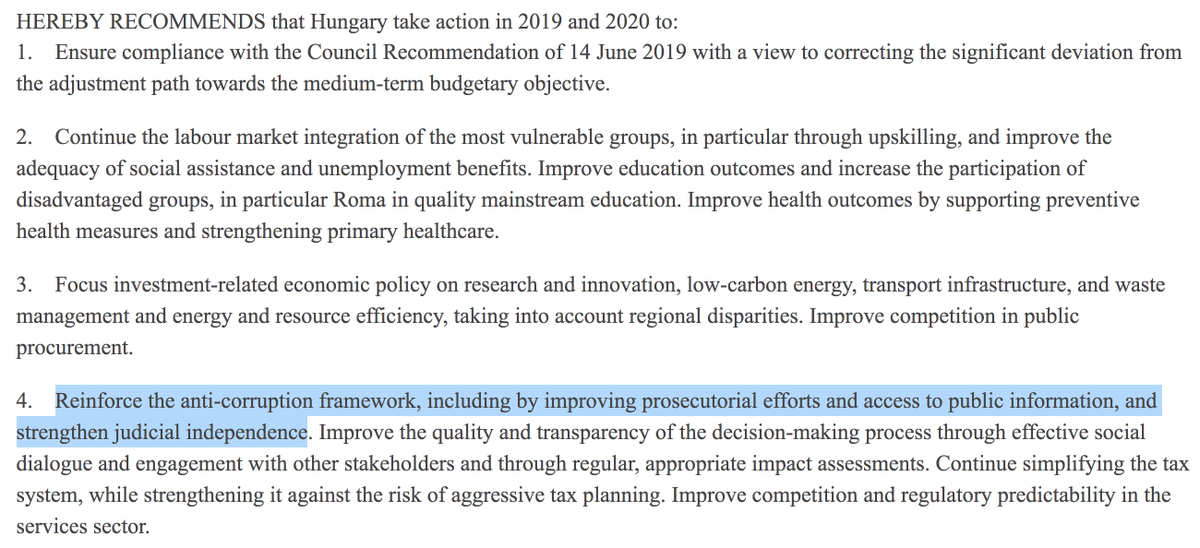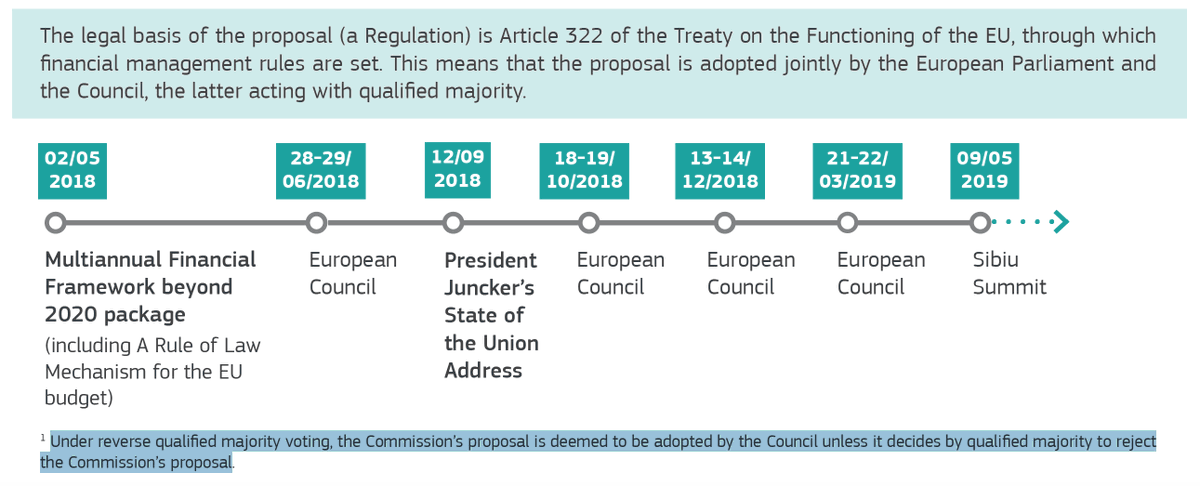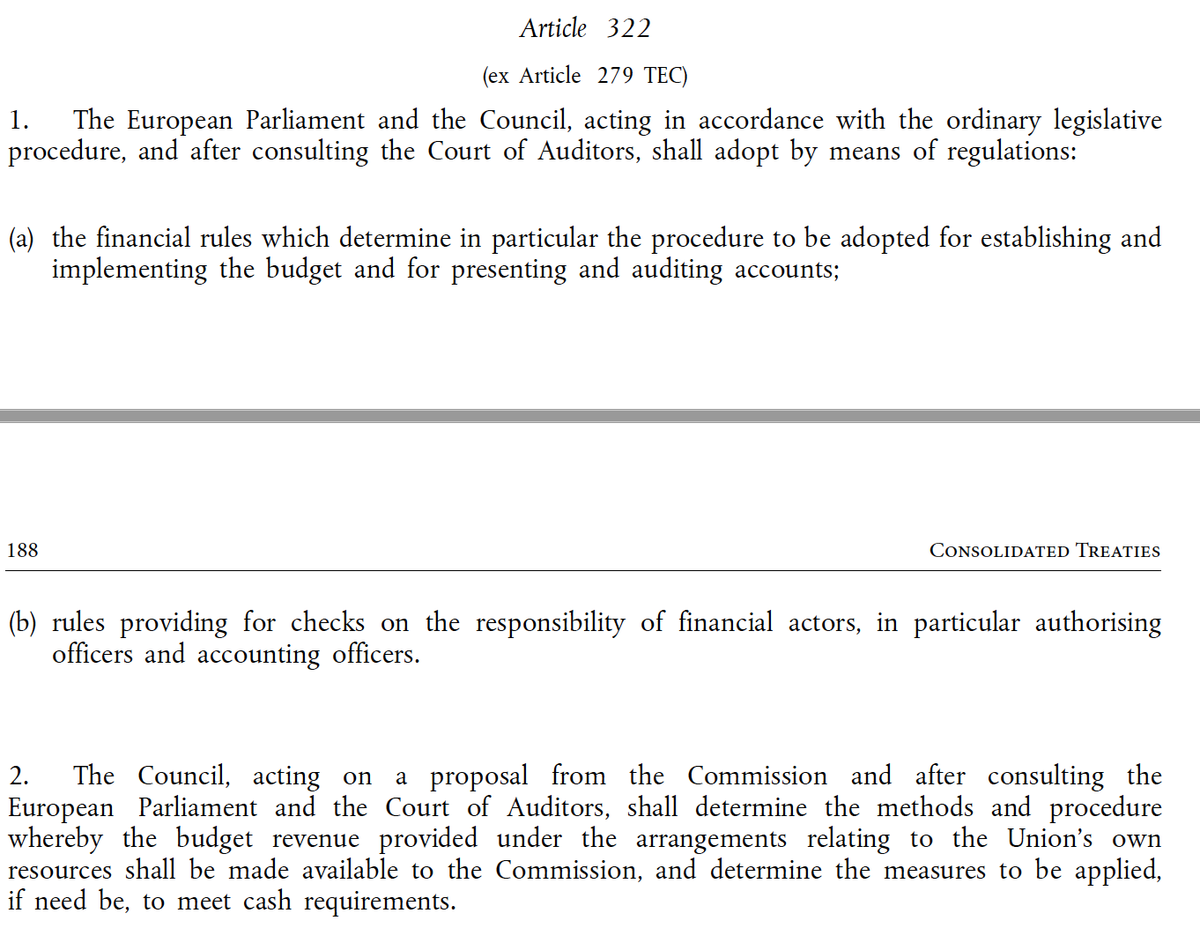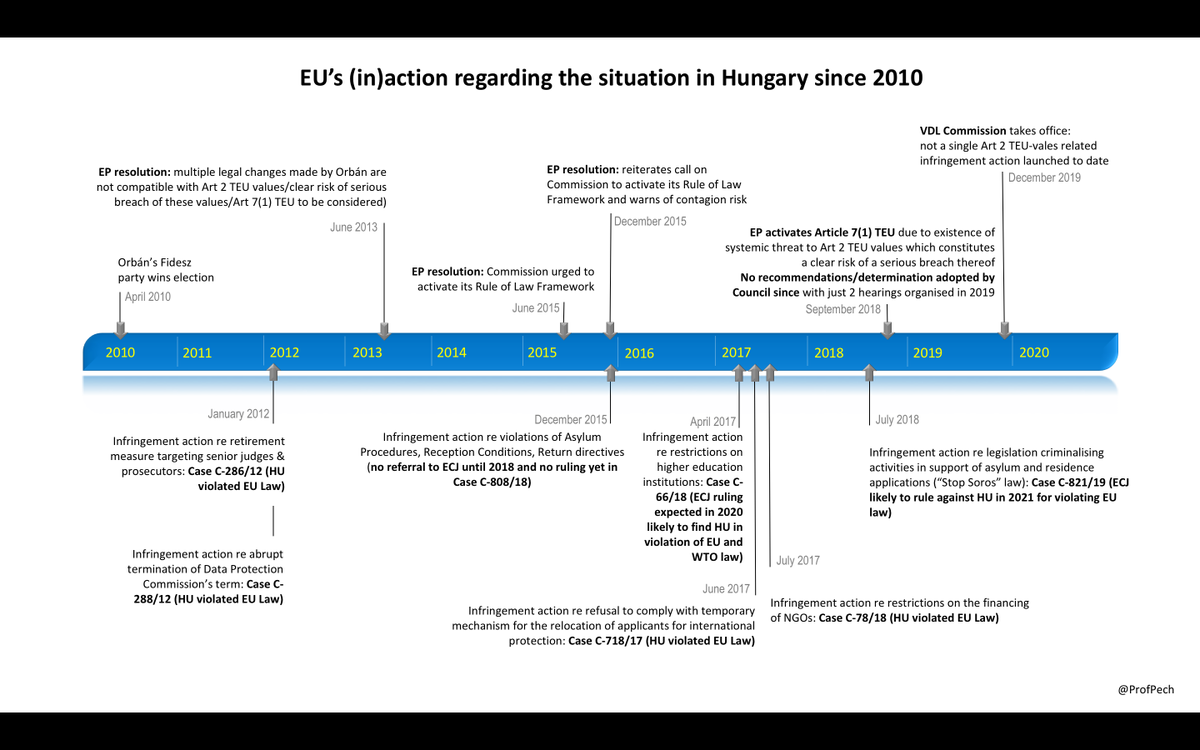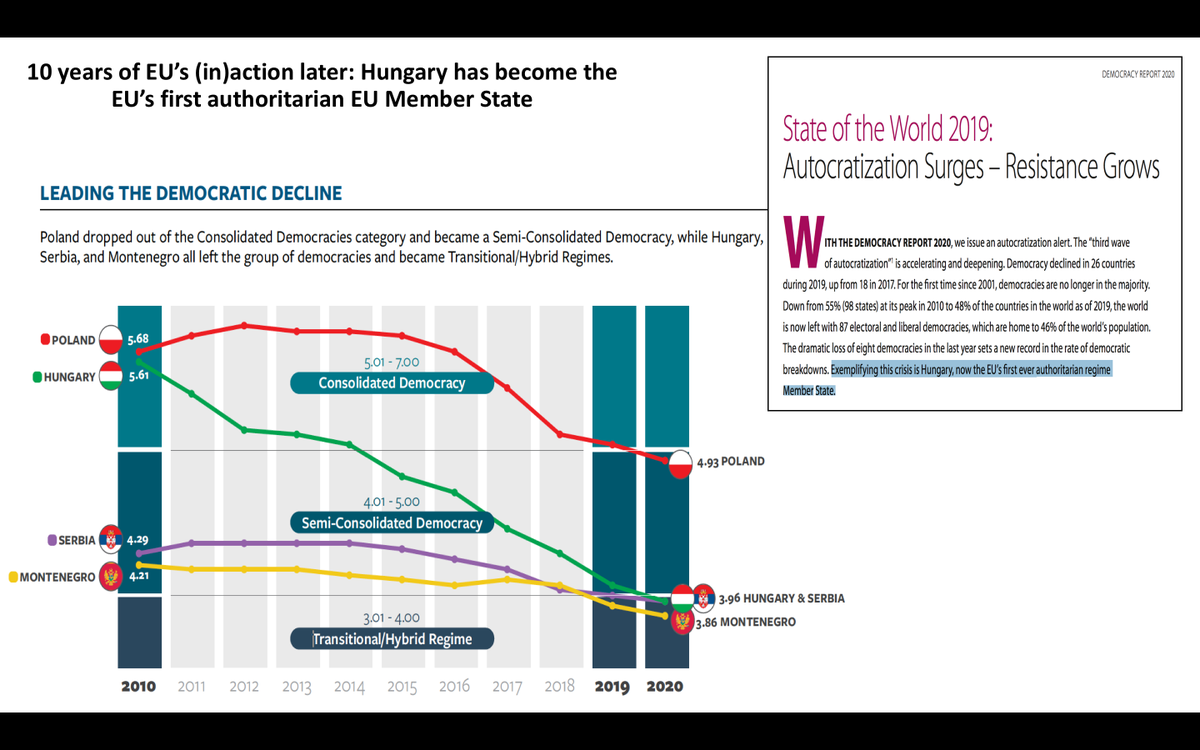My preliminary assessment (thread below) re #ruleoflaw aspects of these conclusions
Health warning: I don’t have a PhD on how to interpret EUCO conclusions so it may well be that my take is erroneous
For other takes see e.g. @JMorijn @JohnOBrennan2 @ADimitrovs @DanielHegedus82 https://twitter.com/EUCouncilPress/status/1285429493482631171">https://twitter.com/EUCouncil...
Health warning: I don’t have a PhD on how to interpret EUCO conclusions so it may well be that my take is erroneous
For other takes see e.g. @JMorijn @JohnOBrennan2 @ADimitrovs @DanielHegedus82 https://twitter.com/EUCouncilPress/status/1285429493482631171">https://twitter.com/EUCouncil...
2/ Different takes you can read, including from most eminent experts, suggest ambiguous EUCO conclusions and this is indeed the case but contrary to noise originating from kleptocrats/autocrats in Budapest/Warsaw, EUCO conclusions contain several positive #ruleoflaw aspects
3/ respect for the rule of law is explicitly mentioned twice with same para appearing in main text in MFF section (para A24) and in horizontal section of Annex (para 22) and there are 2 additional mentions to Article 2 TEU values, which include of course the rule of law
4/ While references to rule of law/Art 2 may seem rather innocuous = explicit direct linkage between compliance with Art 2 TEU (including rule of law) and protection of the EU’s financial interests, something which some had strongly opposed until now https://verfassungsblog.de/never-missing-an-opportunity-to-miss-an-opportunity-the-council-legal-service-opinion-on-the-commissions-eu-budget-related-rule-of-law-mechanism/">https://verfassungsblog.de/never-mis...
5/ Another positive development: agreement in principle to introduce "regime of conditionality" in relation to all funds with reference to “based on this background” = regime must be connected to breaches of Art 2, including rule of law (will deal with sentence in red later)
6/ = proposal going beyond Commission May 2018 proposal which focused on rule of law & while EUCO refers to QM voting system rather than Comm’s reverse QM voting system, still possible for sufficient majority to cristallise against eg Orban’s mafia state https://english.atlatszo.hu/2020/07/21/fidesz-mp-utilizes-eu-funds-to-build-a-spectacular-winery-and-guesthouse-on-mount-badacsony/">https://english.atlatszo.hu/2020/07/2...
7/ Another positive aspect is EUCO inviting Comm to present further measures to protect EU funds. Compulsory EPPO membership + more resources to all of these bodies would be better than mere "measures" but still this is good (underlined in blue is my own comment)
8/ As noted by @JMorijn, another *potentially* positive aspect is para A19 which offers Commission a route to protect rule of law via country-specific recommendations when assessing say, Orban’s recovery and resilience plans: https://ec.europa.eu/info/publications/2020-european-semester-country-specific-recommendations-commission-recommendations_en">https://ec.europa.eu/info/publ...
9/ Furthermore any gov has option to suspend disbursement of grants to say, Orban’s regime, for up to 3 months by referring matter to EUCO + QM of national govs have theoretical option not to approve e.g. Orban’s recovery and resilience plans. Comm can refuse to approve too
10/ Could we expect to see e.g. the Netherlands make use of this “orange card” possibility? politically unlikely. Were the Dutch to refer Orban’s plans to the European Council you could expect retortion and then the system becomes unworkable/poisonous
11/ Similarly, considering VDL Commission& #39;s rule of law record to date (or should I say quasi absence of record?) one can have legitimate concerns about a Comm seemingly more prone to express its concerns regularly than fulfilling its rule of law duties promptly and fully IMO
13/ In addition some highly ambiguous potentially highly negative features (esp para. 23) are present = does this mean previous positive features are no more than mirages?
13/ (should have been 12 before) 2 possible interpretations here
1st interpretation = paves way to adoption by Council of existing but revised 2018 Comm proposal (with no reverse QM voting in it but reverse QM voting still possibly at play if Commission/EP willing to die for it)
1st interpretation = paves way to adoption by Council of existing but revised 2018 Comm proposal (with no reverse QM voting in it but reverse QM voting still possibly at play if Commission/EP willing to die for it)
14/ Second possible interpretation: EUCO implicitly indicating they consider 2018 Comm proposal to be (politically) dead, Comm is implicitly invited to withdraw it and new conditionality regime has to be proposed by Comm to include QM voting in it but not reverse QM voting
15/ See however Merkel’s clarification this morning which suggests 1st interpretation is correct one, with to be “introduced” in conclusions actually meaning to be “adopted” (and here unanimity not required) https://www.bundesregierung.de/breg-de/aktuelles/pressekonferenz-von-bundeskanzlerin-merkel-und-praesident-macron-am-21-juli-2020-1770170
if">https://www.bundesregierung.de/breg-de/a... so = pyrrhic victory for Budapest/Warsaw
if">https://www.bundesregierung.de/breg-de/a... so = pyrrhic victory for Budapest/Warsaw
16/ be that as it may bottom line = there ought to be a new regime of conditionality to protect EU funds and this new regime ought to enable suspension of EU funding on basis of reasons connected to Art 2, including #ruleoflaw so not quite the triumph for autocrats/kleptocrats
17/ Yet there is another quite ambiguous sentence in the same para 23 which is difficult to make sense:
“The European Council will revert rapidly to the matter”
Not clear what “rapidly” and “matter” mean/imply here
“The European Council will revert rapidly to the matter”
Not clear what “rapidly” and “matter” mean/imply here
18/ May 2018 Commission conditionality mechanism proposal is governed by OLP so there is no formal role here for the European Council and certainly no power for the European Council to formally pre-approve any revised or new Commission draft regulation governed by Art 322 TFEU
19/ Merkel& #39;s take suggests there will just be additional *political* discussion of existing but revised Comm proposal. If correct Orban & Kaczynski will only get chance to express disapproval but this will not prevent Council from later adopting by QM vote conditionality regime
20/ Other interpretation suggesting EUCO can formally block adoption of conditionality regime/mechanism unless there is unanimity at EUCO level would mean usurpation of legislative power by EUCO and one would hope Commission / EP would simply refuse to let EUCO get away with this
21/ Unless most governments just give up on #ruleoflaw there will be a conditionality mechanism which is however unlikely to be a game changer. Generally speaking EU has suffered from tendency to spend energy creating rather than properly using mechanisms https://verfassungsblog.de/a-bad-workman-always-blames-his-tools-an-interview-with-laurent-pech/">https://verfassungsblog.de/a-bad-wor...
22/ And while time is wasted designing conditionality mechanism, we& #39;re likely to see Comm continue to fail to fulfil its duty as Guardian of Treaties by either acting too little too late (PL) or doing as little as possible (HU) when much can be done via infringement actions (end)

 Read on Twitter
Read on Twitter